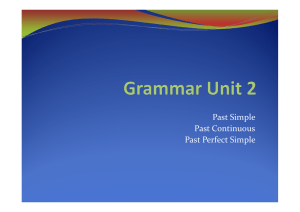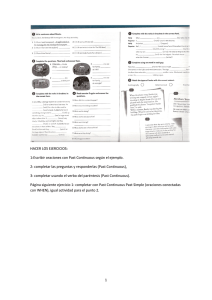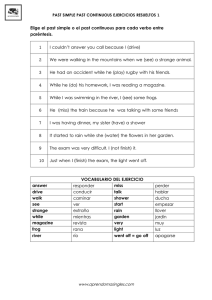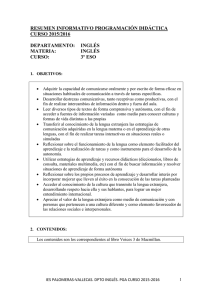PAST TENSES
Anuncio
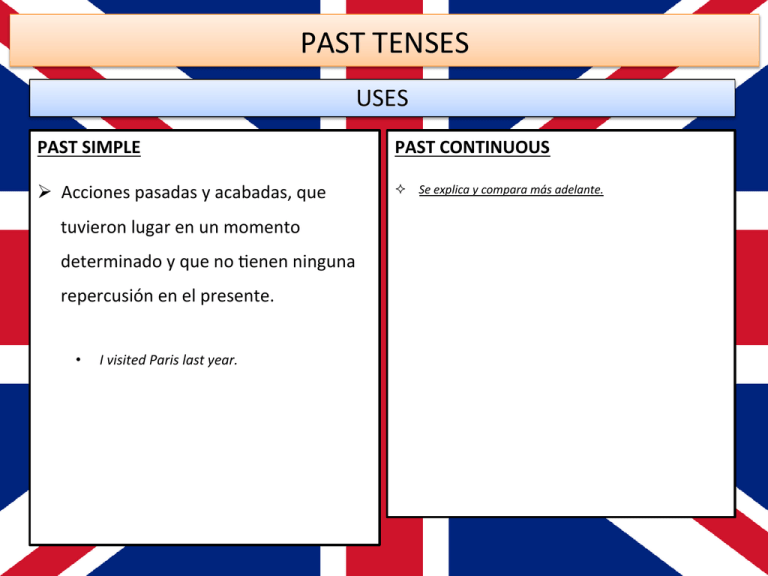
PAST TENSES USES PAST SIMPLE PAST CONTINUOUS Ø Acciones pasadas y acabadas, que ² Se explica y compara más adelante. tuvieron lugar en un momento determinado y que no 3enen ninguna repercusión en el presente. • I visited Paris last year. PAST TENSES TIME EXPRESSIONS PAST SIMPLE • Yesterday ( morning, aOernoon, evening…): ayer por la mañana, ayer por la tarde, ayer por la noche… • The day before yesterday: anteayer • Last week / month / year: la semana pasada / el mes pasado / el año pasado • Ago ( hace ): Se coloca detrás de una expresión que indique Aempo. § Expresión de Aempo + ago ü I visited Madrid two years ago. • The previous ( day / week … ) El día / la semana … anterior • The ( day / week ) before: El día / la semana … anterior PAST TENSES FORM PAST SIMPLE FRASES AFIRMATIVAS REGULAR VERBS : SUJETO + VERBO -­‐ ED + COMPLEMENTOS REGULAR VERBS : SUJETO + 2ª COLUMNA LISTA VERBOS IRREGULARES + COMPLEMENTOS REGULAR VERBS Ø SI EL VERBO ACABA EN “E” è SÓLO DE AÑADE “D” ü Liveè lived Ø SI EL VERBO ACABA EN “ CONSONANTE – VOCAL – CONSONANTE” è ü Stop è SE DOBLA LA ÚLTIMA LETRA stopped Ø SI EL VERBO ACABA EN “Y”… Ø Y DELANTE TIENE UNA VOCAL: SE AÑADE “ED” : Play è played Ø Y DELANTE UNA CONSONANTE: SE CAMBIA “Y” POR “I” Y SE AÑADE “ED” Try è Ø tried PAST TENSES FORM PAST SIMPLE FRASES NEGATIVAS SUJETO +DID NOT / DIDN´T + VERBO EN FORMA BASE ( sin-­‐ ed y sin 3º persona ) + COMPLEMENTOS ü He didn´t go to the cinema EXCEPCIONES: • TO BE • MODALES ü CAN /COULD ü MAY / MIGHT PAST TENSES FORM PAST SIMPLE FRASES INTERROGATIVAS DID + SUJETO + VERBO EN FORMA BASE ( sin-­‐ ed y sin 3º persona ) + COMPLEMENTOS ü Did he go to the cinema ? EXCEPCIONES: • TO BE • MODALES ü CAN /COULD ü MAY / MIGHT PAST TENSES USES PAST SIMPLE Ø Acciones pasadas y acabadas, que PAST CONTINUOUS 1. Acción que estaba ocurriendo ( pero no estaba concluida )en un momento específico del pasado. tuvieron lugar en un • At around 8 o´clock last night, Charles was surfing the Net. momento determinado y que no 3enen ninguna repercusión en 2. Acción larga ( past con3nuous ) que estaba ocurriendo cuando fue interrumpida por otra acción más corta ( past simple). Puede u3lizarse WHEN ( cuando ) o WHILE ( mientras ) el presente. • I visited Paris last year. • I was having a bath when Mary arrived. • While I was having a bath, Mary arrived. PAST TENSES USES PAST SIMPLE Ø Acciones pasadas y PAST CONTINUOUS 3. Dos o más acciones que estaban sucediendo simultaneamente acabadas, que en el pasado. En este caso la oración subordinada suele empezar tuvieron lugar con la conjunción WHILE. en un momento determinado y que no 3enen ninguna repercusión en el presente. • I visited Paris last year. • While Nick was chavng, Terry was doing her homework • Nick was chavng while Terry was doing her homework. 4. Acciones pasadas repe3das y monótonas, indicando que nos desagradaban. • She was always telling me what to do. PAST TENSES TIME EXPRESSIONS PAST SIMPLE • Yesterday ( morning, aOernoon, evening…) • PAST CONTINUOUS • WHILE : While I was watching TV, my sister was listening to music • WHEN: When I was living in London, I met a lot of people. • DURING ( durante ) • Yesterday ( morning, aOernoon, evening…) • At that moment The day before yesterday • Last week / month / year • Ago • Last week / month / year • The previous ( day / week … ) • All day / night… • The whole ( day / night /week … ) ( todo el / la…) • The ( day / week ) before PAST TENSES FORM PAST CONTINUOUS SE AÑADE –ING AL FINAL DEL VERBO FRASES AFIRMATIVAS • SUJETO + TO BE ( WAS / WERE ) + VERB – ING ü I was speaking in English at that moment FRASES NEGATIVAS • SUJETO + TO BE (WAS / WERE ) + NOT + VERB – ING ü I was not speaking in Spanish at this moment ü They weren´t playing cards when the teacher arrived. FRASES INTERROGATIVAS • TO BE (WAS / WERE ) + SUJETO + VERB – ING ü Was Antonio watching TV at that moment? ü Were you paying awenAon while the teacher was talking to you?
